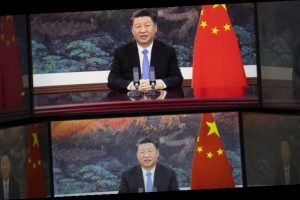Two-track Xi reveals China is in no mood for reconciliation

The 25-minute speech was a masterclass in double-speak.
China’s President Xi Jinping told world leaders to shelve their differences as his country blocks $20 billion in Australian exports. He warned confrontation would lead us to a dead end, after China flew two dozen warplanes over Taiwan at the weekend. He said the “strong should not bully the weak” as Beijing wipes out democracy in Hong Kong.
Two-track Xi was in full swing at the World Economic Forum in Davos overnight. The hypocritical divide between China’s actions and its leader’s spin is inexorable, but it does offer insight into how Xi wants the world to view China.
Chinese President Xi Jinping. Credit:AP
First, Xi wants the world to abandon “ideological prejudice”, an oft-repeated phrase that paints Communist China as the victim of Western liberal discrimination.
“Difference in itself is no cause for alarm,” he said. “What [it] does bring alarm is arrogance, prejudice, and hatred. It is the attempt to impose hierarchy on human civilisation, or to force one’s own history, culture, and social system upon others.”
The comments are directed at the United States and its allies. Australia has become a vector through which China warns the West against acting on its ideological prejudices by restricting Chinese investment, political interference and condemning human rights abuses.
Xi’s comments show that China will continue to paint itself as a victim despite its campaign of economic coercion against a country with GDP a fourteenth of its size. The interminable $20 billion dispute with Australia has no chance of reconciliation when its biggest player remains adamant it has had no role in being an oppressor.
Second, the world may condemn the crackdown in Hong Kong and Beijing’s threats to Taiwan but Xi’s China is a “staunch follower of independent foreign policy of peace”.
“China is working hard to bridge differences through dialogue, resolve disputes through negotiation, and to pursue friendly and cooperative relations with other countries on the basis of mutual respect, equality, and mutual benefit,” Xi said.
Of course, Hong Kong and Taiwan are not part of China’s foreign policy. Hong Kong (a semi-autonomous region) is now part of the mainland’s political domain in all but name and independent neighbour Taiwan is an “inalienable part of China,” despite the democratic will of its 24 million people.
Which means we can disabuse ourselves of the notion this foreign policy of peace applies to either as China sends dozens of fighter jets and bombers over the Taiwan Strait.
Xi’s message to Davos when it comes to Hong Kong and Taiwan is to stop “meddling in other countries’ internal affairs”.
Thirdly, the domestic front is about to become a lot more vital to China if it is to protect its economy from economic sanctions and global volatility that on its current trajectory, are likely to hit it throughout the 2020s.
Xi made this explicit in his speech to world business and political leaders. After decades of riding global economic growth and an export powered economy, China is turning inwards. Increasingly, its 1.4 billion people will be encouraged to produce and consume products at home. The policy of protectionism announced at a meeting of the global capitalist elite.
“As China enters a new development stage, we will follow a new development philosophy and foster a new development paradigm, with domestic circulation as the mainstay, and domestic and international circulations reinforcing each other,” he said.
Finally, the question of whom the speech was really for. An increasingly sceptical West, led by the United States and Australia and now followed by the UK, Germany and France, will find little in the tea leaves to suggest a diplomatic reset is on the cards.
But poorer nations have a self-appointed and progressively more vocal leader in China.
“For developing countries, they’re aspiring for more resources and space for development, and they’re calling for stronger representation and voice in global economic governance,” Xi said.
“We should recognise that with the growth of developing countries, global prosperity and stability will be put on a more solid footing, and developed countries will stand to benefit from such growth.”
Here Xi continues his foreign policy direction, giving attention to economically neglected countries that have been sidelined by western powers in the multilateral arena.
The West should take note. More than 50 countries defended China’s crackdown in Hong Kong at the UN Human Rights Council in July. A superpower with a COVID-19 vaccine and the promise of power and investment in the years to come could secure the support of many more.
Most Viewed in World
Source: Read Full Article

